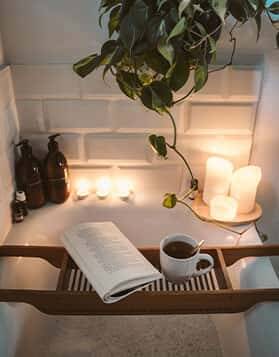My Pillow is a Priority
Raise your hand if you woke up feeling well-rested every day this week?
No?
You are not alone. Scientific studies are showing that over 40% of the global adult population is sleep deprived. Sleep disorders like insomnia or sleep apnea are common sleep preventers, however many of us are consciously choosing to sleep less.
Although an odd night here or there each week may seem harmless, experts are raising their voices to say otherwise. I can’t help but wonder: are we really listening or is this information falling on deaf ears?
Technology and sleep don’t have the best reputation, however, certain breakthroughs are supporting our knowledge about the importance of sleep. We no longer need to be in the dark or depend on a specialist to understand sleep paralysis and receive tips on how to improve sleep – ‘Hello Google’. Wearable devices that track sleeping patterns have become the trending gadget and conversation starters (if you didn’t track it, does it really exist?). We wake up to so much information (the level of accuracy can be debatable) telling us whether we got enough REM sleep or how many times we woke in the middle of the night. We love to be informed, but what actions are we actually taking from it?
I know what I’m about to say, is something many people can only *dream* about. I sleep like a baby – on public transport, before a plane takes off or even sitting in a packed sports stadium (I won’t mention the sport!) without the help of sleeping pills. I take advantage of being able to fall asleep quickly by not giving it as much importance. I’ll admit it – I sometimes think sleep is a nuisance. Why do I need 7–8 hours of it? Surely every minute of every day counts and I can always catch up on my sleep over the weekend, right? And so, I tend to push my bedtime out regularly, opting for more time with friends, late-night movies or just catching up on some work. My morning cup of green tea will fight off that zombie feeling and everything will be smooth sailing….
Sleep is just as important for adults, as it is for a child’s development
As my head hits the pillow each night, rarely do I find myself thinking about what actually happens to my body and most importantly my mind. Is it the sheer exhaustion or just slight ignorance of knowing all I’ve got to do is close my eyes and when that alarm bell rings, I’ll be ready to spring back into action for a new day.
Don’t get me wrong, my daily gratitude list will always mention my mind and body, but recently I knew this wasn’t enough. It didn’t take me long to find hundreds of articles discussing inconsistent or poor quality of sleep and its impact on our health. A little alarm went off inside my head. I reflected on my “self-care” routine - eating clean, exercising, meditating, practicing positive self-talk and yet the simplest thing I could do was get to bed earlier and go to sleep. I now consider it the best source of kindness to myself.
When we close our eyes, our brains start working again but in a completely different way than when we’re awake. Billions of neurons work together to be your housekeeper - removing any toxins, sorting through the realms of information received throughout the day and even running checks on our enzyme and hormone levels. Scientific research is showing that sleep is more powerful than any drug for helping to restore our brain and body. By committing to the recommended 7-8 hours of shut-eye, you’ll see improvements in concentration, mood, memory and maintain the fat-burning systems that help regulate our weight.
Sleep and Mindfulness play a role together
Mindfulness is the ability to focus on the present moment, while calmly acknowledging and accepting any thoughts, feelings or bodily sensations that may pop up. Mindfulness can be challenging for most of us at the beginning – forget running on close to zero energy levels from our lack of sleep the night before. It doesn’t mean sitting on a cushion and meditating but being aware of the moment you are currently experiencing – your tasks in work, cleaning your house or going for a run. Research is showing that the quality of sleep plays a vital role in our mindful attention throughout the day.
Sleep deprivation has been linked to individuals being overwhelmed by automatic negative thoughts (ANTs) which then leads us to feel high levels of negative emotions. The racing mind of thoughts promotes excessive awakening of negative emotions and makes it hard to fall asleep. I’ve been in that vicious circle, but I found my escape tool – mindful meditation.
Research continues to show that introducing mindfulness practices can help regulate our emotions, replacing negative emotions with more positive ones. Thus, calming our nervous system and inviting more awareness to allow rational thinking. As mentioned above, one of my favorite practices is mindful meditation which helps me get into a deep state of relaxation (no stress). It involves focusing on your breathing and then bringing your mind’s attention to the present without drifting into worries about the past or future. Relaxation helps reduce our stress levels which is a key contributor for being able to drift off to sleep.
How can we fall asleep more quickly
Many of us have struggled with falling asleep from time to time and will most likely experience it again. The big culprits being stress and anxiety of the past or thinking too much of the future – ‘I can’t believe that happened today’ or ‘What will my manager say?’. We need to be able to regulate our emotions and calm our racing minds to achieve optimal sleep. Below are some of the recommendations to help our quality of sleep and sleeping habits:
Set a schedule – choose a time for going to bed and waking up and be consistent (7-8 hours)
Exercise – avoid exercising late at night, especially an hour before bedtime
Bedroom ambience – keep your room at a comfortable temperature, with no bright lights or loud sounds
Tech free – try to stay away from your phone 30 minutes before bed. The bright causes stimulation within the mind and we find it harder to switch off. Turn it on silent or sleep mode to help the transition.
Caffeine – avoid drinks containing caffeine late at night, opt for chamomile or peppermint tea
Supplements – Ashwagandha is a natural herb that can help battle stress and anxiety and Magnesium helps activate the neurotransmitters responsible for sleep.
Relax – try a warm bath (water is known for it’s calming affect on the body), reading or meditating
There are a lot of tips on how to improve sleep or fall asleep quickly and I hope most of you will find comfort when putting them into practice. In the situation that it hasn’t improved, try to avoid feeling frustrated – I know easier said than done, especially when feeling tired and our mood is lower than low. Go see your doctor and most conditions like insomnia or sleep apnea can be treated effectively.
For those of us that have more control over our sleep, make your pillow a priority in your self-care routine and I wish you the sweetest of dreams.
Over 40% of the global adult population are sleep deprived.

- Dubai, Festival City Mall, Crescent Drive
- +971-54-382-8897
- Mon-Sun 9.00 - 18.00
- [email protected]
- View on map






